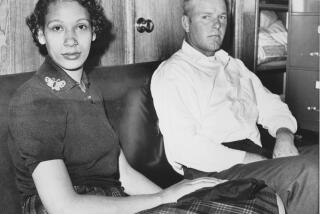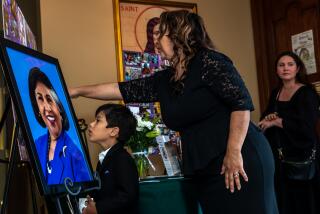Op-Ed: Clerking for Justice Ginsburg, we learned about the law — but also about love
- Share via
A dozen years ago, the two of us had the amazing good fortune to serve together as law clerks for Justice Ruth Bader Ginsburg on the Supreme Court. She was our boss, our mentor, a sage advice-giver and a patient teacher. What we learned in her chambers still guides us today — lessons about diligence, decency, courage and (in a plot twist) love.
The justice set dauntingly high expectations for her law clerks, while also treating us and the rest of her judicial staff like family. One moment her red pen would double your workload; the next, her smile would make your day. She may have been a diminutive then-septuagenarian, but she consistently outlasted our team of clerks, five eager recent law school graduates nearly 50 years her junior. And, after exhausting us, she’d still have energy to hit the gym — often sporting an oversized sweatshirt emblazoned with the words “Super Diva.” (We lived in fear that she would one day challenge us to a pushup contest. We wouldn’t have stood a chance.)
Her famously warm and hilarious spouse, Marty, would sometimes ring chambers: “When will her Highness be coming home tonight?” The answer was usually not until late.
We were working for Justice Ginsburg when she was first diagnosed with pancreatic cancer. She called us into her office and informed us, with characteristic understatement, that she had “some not altogether happy news” to relay. We were gutted. She was stoic.
Without even a trace of self-pity, she vowed to press on at “full steam.” And she did. We sent stacks of papers to her hospital room after she had surgery and then to her home as she recuperated. She had one of us come over on a weekend to help finish an opinion, while Marty nourished us with soup and good cheer. And when the court’s next argument session came, she was back on the bench — and back in the gym.
The justice kept up her relentless pace because she believed in her work and in doing the job right. She crafted her opinions with exacting rigor, fueled, it seemed, by little more than coffee, cafeteria cookies and sheer determination.
We quickly learned that she chose each word with care, and that we, too, should be ready to defend every last word and punctuation mark we wrote. She steered us away from disparaging comments and overheated rhetoric, even when (too often) she found herself in dissent. As she saw it, bluster was no way to win over a skeptic. Better, she thought, to stick to unassailable logic and essential truths.
There was so much law to learn in Justice Ginsburg’s chambers, but also so much to learn about character and about life. You couldn’t work there without being moved by the mutual tenderness between the justice and Marty (who passed away just a year after we finished our clerkships). He was a well-known Renaissance man, not just a highly regarded tax lawyer but also an accomplished chef who baked a cake for each of our birthdays, plied us with homemade biscotti and kept us all in stitches with his jokes and teasing. He sang the justice’s praises and looked at her with unvarnished love. The boss played the straight man to Marty’s comedian, but she chuckled at his jokes, doted over him when he was sick and gazed at him with pride.
We are deeply in debt to Justice Ginsburg for an unforgettable career experience. And we owe her far more than that. Shortly after our clerkship ended, we began dating. When one of us shared this news with the justice on a visit to the court (only because, omnisciently, she asked if we were still close friends), she leapt from her chair with open arms. The gleeful leaping and hugging were sufficiently unusual that we felt the need to clarify that we were just dating; there was no other news. She responded with a nod and a knowing smile.
A few years later, the justice flew to California to officiate at our wedding. (We assured her that we would understand if she couldn’t make the long trip, but she informed us that under California law, U.S. Supreme Court Justices are expressly authorized to perform weddings, and that she would be there.) It was a joyous day, as weddings are, and the justice was generous with her time and welcoming to our families. She even laughed along as the best man quipped about her matchmaking. When she left our reception that evening, she congratulated us once again and gave us a wedding wish: “Now you just have to be as happy as Marty and I were.”
We’ve thought of that heartfelt wish so often since then. With marriage, as with everything else, the justice set a high bar. She tirelessly championed righteous causes and lofty ideals, and also devoted herself to the family she adored. She inspired millions of people she never met and also enriched the lives of those of us who were lucky enough to know her. It is difficult to lose her, especially now. But we know the best way to honor her is to try to live as fully as she did, embracing the values she held dear.
Miriam Seifter and Robert Yablon are associate professors of law at the University of Wisconsin Law School. They clerked for Justice Ruth Bader Ginsburg in 2008-2009.
More to Read
A cure for the common opinion
Get thought-provoking perspectives with our weekly newsletter.
You may occasionally receive promotional content from the Los Angeles Times.










